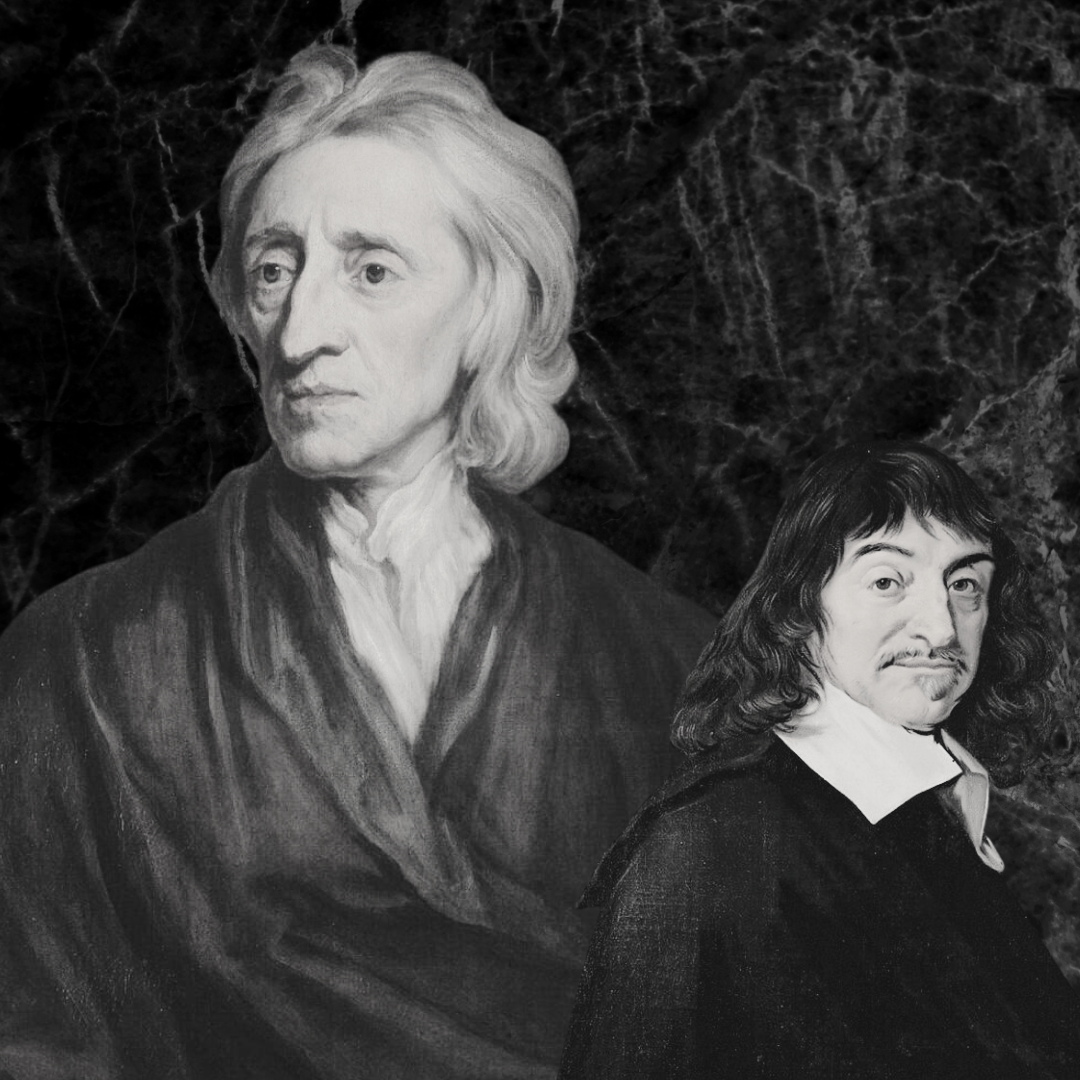René Descarte and John Locke had opposing metaphysics; they had opposing theories on being, knowledge, and substance to name a few. The Cartesian view holds that the essence of matter is extension, that extension is the essence of body. Locke strongly opposed this concept and argues that body and extension are two distinct ideas. He disproves Descartes’ Mind-body dualism and its definition of body as extension by establishing how human knowledge is obtained, differentiating the definitions between body and extension by using the idea of pure space as its premise, and by offering reasons why body and extension differ. That being said, Locke’s theory of knowledge allows him to derive knowledge rather than probable opinion that mind and matter are not distinct substances.
To begin, Descartes’ Mind-Body Dualism is the view that mental phenomena (the mind) is distinct and separate from the body. In his Meditations on First Philosophy (1641), Meditation Two, Descartes disregards his bodily senses and asserts that only the mind can be trusted (Descartes 63). Part of this concept includes Descartes’ Method of Doubt (Descartes 60), wherein which he concluded that many of his beliefs are false, and thus could not count for any knowledge. To determine whether something is true or not, Descartes disregarded any beliefs that created any doubt in its reality and found that the beliefs that he gained through his senses could be doubted, therefore perceptions made by the body are not to be believed as true. For Descartes, knowledge consists of ideas to which we can never doubt, on complete and perfect certainty; since we are able to doubt the perceptions of the body, this enables all of its conclusions to be false. Only ideals and conclusions made by the abstract realm of the mind would be considered true knowledge, which Descartes exemplifies using theories in geometry and maths.
Descartes was an innatist and believed God brought us into this world with preconceived ideas, doctrines, and knowledge that we eventually realize. He believed that, although these ideas may not initially be brought into realization right away, experience may eventually enable the being to discern whatever belief or knowledge that was buried deep within their minds.
Locke, on the other hand — in An Essay Concerning Human Understanding (1689), Book I — argues against the innatist by affirming that one is not born with preconceived principles, and instead, derives all knowledge from natural faculties. Upon entering this world, Locke compares man to a white piece of paper with nothing written on it, its words eventually established through experience. Locke states that all our understanding, all our human knowledge, is derived from our perceptions of external objects and through the internal operations of our minds (Locke Book II, Chapter I, segment ii). We are born into this world with no knowledge, but it is with experience that we eventually obtain some of it through our bodily perceptions of the external world. He mentions two foundations of human knowledge, to which he has referred to has sensation and reflection. Sensation is exhibited when our senses are applied to external objects and conveyed by the mind to form distinct perceptions of those things (Locke Book II, Chapter I, segment iii); reflection is exhibited when the internal senses of the mind is conscious and comprehends the actions of the mind found within us (Locke Book II, Chapter I, segment iv). All our ideas take their beginnings from sensation and reflection, where we gather external material things as objects of sensation and the operations of our minds through reflection. From sensation and reflection, we derive our simple ideas, from which, according to Locke, all our knowledge derives from. It is then with these simple ideas we would be able to combine, compare, and abstract them to form complex ideas (Locke Book II, Chapter XII, segment i).
To reiterate, the Cartesian view holds that the essence of body is extension (res extensa), whereas the essence of mind is pure thought (res cogitans). Descartes’ Mind-body dualism distinguishes the two substances as different entities of being. According to him, extension is the defining characteristic of the body because physical objects (like body) have the property to take up space, unlike mental phenomena (or, the mind), which takes up no space.
However Locke uses the idea of pure space to differentiate between extension and body, namely, by defining the two terms and stating that body can be defined as “something that is solid and extended, whose parts are separable and movable in different ways,” with extension defined as the space that lies between the extremities of the solid parts of the body (Locke Book II, Chapter XIII, segment xi). Locke gives three reasons why body and extension are two distinct ideas: firstly, extension does not include solidity or resistance to the motion of body, as body is (Locke Book II, Chapter XIII, segment xii). Secondly, the parts of pure space (or extension) are inseparable from one another, its continuity unable to be divided in any way (Locke Book II, Chapter XIII, segment xiii). And Lastly, extension is immovable and inseparable because motion is the change of distance between any two bodies (Locke Book II, Chapter XIII, segment iv). Space is inseparable, immovable, and without resistance to the motion of the solid; whereas body is not. The extension of space is the continuity of unsolid, inseparable and immovable parts, however the extension of body is the cohesion of solid, separable, and movable parts (Locke Chapter IV. segment v). With that being said, the definitions between extension and body compliment each other rather than define each other altogether.
For Locke, all knowledge derives from the perceptions of the body, the very same body that Descartes denies and is sceptic about. Descartes distinguishes the mind from the body (or the body from the mind) and doubts whatever ideas we perceive from the external world for the mental beliefs that are conceived. Descartes believed we are born into this world with innate principles placed into us by God; Locke, however, refutes the notion of being born with preconceived ideas and believes that all knowledge derives from sensory experience (God making us with the limited ability to fathom as much knowledge as our senses could accept). Locke’s theory of knowledge allows being to be able to derive all knowledge from the senses, however Cartesian doubt enables being only mere probable opinion, to distrust the perceptions of body because it is incapable of truth. For Descartes, we can only obtain something’s truth (or knowledge of it) if it cannot be doubted in any way, and because one is able to doubt the experiences of the body, we are unable to derive any truths or knowledge from it. Locke’s theory of knowledge enables him to derive knowledge, rather than mere probable opinion, that mind and body are not distinct substances because knowledge is, first and foremost, experienced through the bodily perceptions. Before knowing anything else, we live our lives thoroughly through the perceptions of the body, we experience life and primarily derive all ideas from the senses; why would we deny our perceptions for the abstractions of the mental when our perceptions are what we physically experience more than anything else? Descartes was delusional to distrust the senses perceived by our body, our being contains the perceptions made from both mind and body, to which all knowledge of ideas are exhibited and understood from the external.
Works Cited
Descartes, René. Discourse on Method and Meditations on First Philosophy. Translated by Donald A. Cress,
4th ed., Hackett Publishing Company, Inc., 1998.
Locke, John. “An Essay Concerning Human Understanding (Excerpts of Book I & II).” Translated by Jonathan





